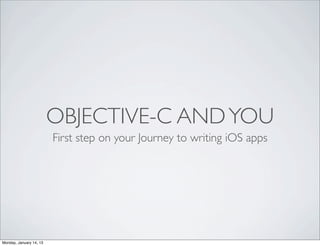
iOS Hackathon 2012 Objective-C talk
- 1. OBJECTIVE-C AND YOU First step on your Journey to writing iOS apps Monday, January 14, 13
- 2. ABOUT • Started Programming since 14 years old. iPhone development for 2+ years • Runs software development company Getting Real - Clients include Prestige Magazine, Google Earth Hour etc.. • Does iOS Corporate Training - Clients include OCBC, Imerys, Barclays bank, IDA etc.. • Decided to go into mobile development because smartphones have changed and will continue to change the world Monday, January 14, 13
- 3. WHY LEARN APP DEVELOPMENT? • As of Jan 2013 - Apple has paid out of USD $7 billion to developers • Apple now has over 200 million iTunes accounts - the largest credit card hub on the internet. Earning money online has never been easier Monday, January 14, 13
- 4. PREREQUISITES • An Intel-based Mac • Xcode IDE Monday, January 14, 13
- 5. OBJECTIVE-C BASICS And a random motorcycle. Monday, January 14, 13
- 6. WHAT IS OBJECTIVE-C? •A general purpose, high-level, object-oriented programming language that is a wrapper over C programming language • The main programming language used by Apple for iOS programming Monday, January 14, 13
- 7. WHY OBJECTIVE-C? • Use Objective-C if you don’t want your app to suck. Seriously. Monday, January 14, 13
- 8. OBJECT ORIENTATION • Using objects as ‘data models’ •A way to think about programming Monday, January 14, 13
- 9. VOCABULARY • Class - The generic “type” of an object. e.g. Smartphones • Instance - A specific object of a given class. e.g. iPhone 5 • Method - A function that an object performs. e.g. Make call, send message, surf for cat pictures on 9GAG • Variable - A quantity or value. e.g. Percentage of battery life, number of messages in inbox. Monday, January 14, 13
- 10. MORE VOCABULARY • Class - Car • Instance - BMW Z4 • Methods - Drive, convert roof, attract women • Variables - Amount of fuel, speed (km/h) Monday, January 14, 13
- 11. DATA TYPES Name Explanation Example void Nothing - int Integer or number 1, 2, 3 float Decimal-point 3.14562 BOOL Yes or No YES, NO NSString Sentence/ Word @”Hello World” id Anything - Monday, January 14, 13
- 12. DECLARING DATA TYPES int cupsOfCoffee; int amountOfWork float productivityLevel; cupsOfCoffee = 3; productivityLevel = cupsOfCoffee * amountOfWork; Monday, January 14, 13
- 13. DEFINING VARAIBLES Class *objectName; - NSString *mySentence; What is the * ? Not for C types like int, float, BOOL Monday, January 14, 13
- 14. METHODS •A function that an object can perform • Can return a value, or not • e.g. the BMW class will have a getPrice method - (int)getPrice:(Car *)typeOfCar { // Input code here return carPrice; } Monday, January 14, 13
- 15. METHODS • Use Parameters / Arguments to pass more information to methods • Example: squareNumber - (int) squareMe: (int)x { return x * x; } [self squareMe:20]; Monday, January 14, 13
- 16. METHODS • Methods with more than one parameter/ argument • Example: multiplyNumbers - (int) multiplyNumbers: (int)x andSecondNumber: (int)y{ return x * y; } int numProduct = [self multiplyNumbers:10 andSecondNumber:50]; Monday, January 14, 13
- 17. METHODS • Invoking Methods on Objects [object method]; [object methodWithArgument:argument]; int variable = [object methodWithArgument:argument]; float batteryLifeLeft = [iPhone getBatteryLife]; Monday, January 14, 13
- 18. LOOPS AND CONDITIONS Making your code smart Monday, January 14, 13
- 19. LOOPS • Execute a piece of code multiple times • Automate repetitive tasks Monday, January 14, 13
- 20. FOR LOOP • Running a ‘for’ loop for ( initialization ; test condition ; increment) { // Code block } for ( int i = 0 ; i < 10 ; i++) { NSLog(@”Hello fellow iOS devs!”); } • This will print “Hello fellow iOS devs!” to the console 10 times Monday, January 14, 13
- 21. WHILE LOOP • Running a ‘while’ loop while (condition is true) { // Execute code } BOOL isNetworkConnected = YES; while (isNetworkConnected) { [self downloadData]; } • This will download data so long as the network is connected Monday, January 14, 13
- 22. CONDITIONALS • An important idea in programming is taking different actions depending on different circumstances • Conditional expressions are always either true or false • e.g. Is there coffee available in the pantry? If yes, make some coffee. If not, lament in despair (or just go out and buy some) Monday, January 14, 13
- 23. IF-ELSE STATEMENTS • Writing an if-else statement int number = [self getNumberFromInput]; if (number > 9) { NSLog(@”Number is a double-digit number”); } else if (number == 0) { NSLog(@”Number is not valid”); } else { NSLog(@”Number is a single digit number”); } Monday, January 14, 13
- 24. COMMON CLASSES • Introduction to a few commonly used classes • Not exhaustive Monday, January 14, 13
- 25. NSOBJECT • NSObject is the base class that every object in Objective-C and Cocoa Touch inherits from Monday, January 14, 13
- 26. NSSTRING • NSString is an extremely commonly used class • Type for ‘sentences’ or ‘words’ • NSString *myString = @”Hi There!”; Monday, January 14, 13
- 27. NSARRAY • Type for a collection or ‘array’ of objects grouped together NSArray *weapons = [NSArray arrayWithObjects:@”rifle”, @”pistol”, @”plasma gun”, nil]; Weapon *equippedPistol = [weapons objectAtIndex:1]; • Remember in programming we always start counting from 0 Monday, January 14, 13
- 28. NSDICTIONARY • Type for a collection of objects indexed using key-value pairs NSDictionary *playerData = [NSDictionary dictionaryWithObjectsAndKeys:@”playerWeapons”, @”rifle”, @”highScore”, 9214, @”numberOfLivesLeft”, 3, nil]; int livesLeft = [playerData objectForKey:@”numberOfLivesLeft”]; Monday, January 14, 13
- 29. THANK YOU! Gabriel Lim Getting Real Software Development www.gettingrail.com Monday, January 14, 13
